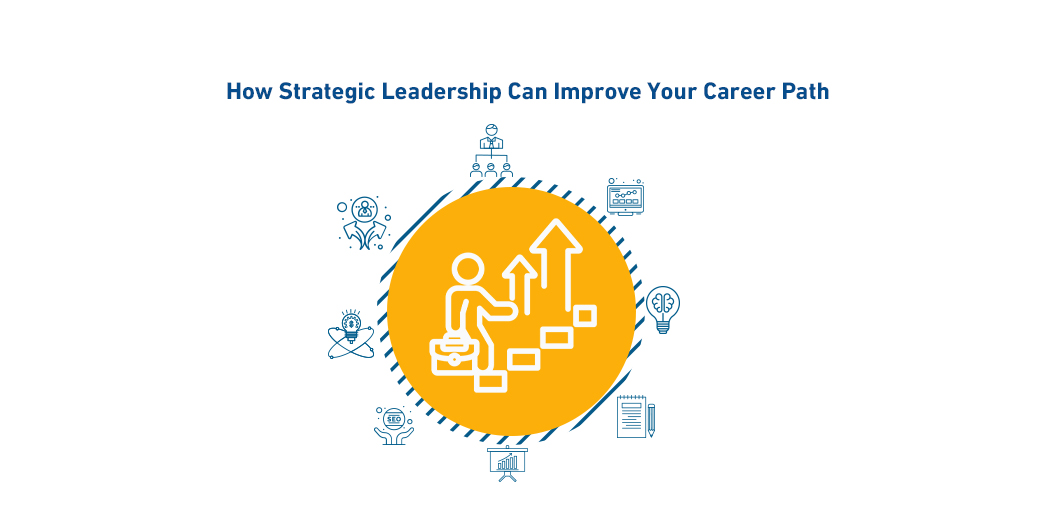
How Strategic Leadership Can Improve Your Career Path
In today's rapidly changing and highly competitive job market, strategic leadership plays a crucial role in
enhancing individuals' career paths. Strategic leadership is not limited to top executives; it is a fundamental skill that can boost individual performance and contribute to career success at all levels. By employing well-thought-out strategies and long-term thinking, strategic leadership helps individuals achieve their career goals effectively and build strong, sustainable career paths.
Understanding Strategic Leadership
Strategic leadership is the ability to think long-term, set clear goals, and develop strategies to achieve these goals effectively. It requires individuals to analyze their environment, make informed decisions, and direct their efforts toward achieving their professional vision. Unlike traditional leadership, which focuses on daily management, strategic leadership emphasizes strategic analysis and planning.
The Importance of Strategic Leadership in Enhancing Individual Performance
Strategic leadership provides a framework for achieving career success through the development of clear strategies and focused efforts. It helps individuals improve their professional performance in several ways:
1. Setting and Achieving Goals
A core aspect of strategic leadership is clearly defining goals. By setting specific, measurable objectives, individuals can create an action plan to achieve these goals. Strategic leadership helps individuals focus on what is important, prioritize tasks, and take necessary steps to succeed in their careers.
2. Developing Strategic Thinking Skills
Strategic thinking involves analyzing the professional environment and understanding trends and challenges. By enhancing strategic thinking skills, individuals can improve their ability to make informed decisions based on data and future forecasts. This can lead to better performance and open doors to new opportunities.
3. Enhancing Adaptability to Change
In a changing work environment, adaptability is crucial. Strategic leadership enables individuals to prepare for future changes and handle challenges with flexibility. By developing strategies for adapting to change, individuals can maintain career stability and achieve success during tough times.
4. Building a Strong Professional Network
Strategic leadership also includes the ability to build a strong professional network. Through effective communication and forming strategic relationships with colleagues and industry partners, individuals can enhance their career opportunities, expand their influence, and gain valuable support to achieve their goals.
5. Improving Personal Leadership Skills
Strategic leadership fosters the development of personal leadership skills, such as motivation, people management, and making tough decisions. These skills are essential for achieving success in leadership roles and developing a successful career path. By improving personal leadership skills, individuals can positively impact their teams and increase their effectiveness at work.
Strategies to Enhance Your Career Path through Strategic Leadership
1. Establish a Clear Vision for Your Career Goals
Strategic leadership begins with establishing a clear vision for your career goals. Identify what you want to achieve, whether it's obtaining a promotion, changing careers, or developing new skills. By clearly defining these goals, you can create a strategic plan to achieve them and direct your efforts toward success.
2. Develop a Detailed Action Plan
After setting goals, develop a detailed action plan to achieve them. Identify the steps you need to take, resources required, and create a timeline for each phase. With a clear action plan, you can track your progress and adjust strategies as needed.
3. Analyze the Professional Environment
Use strategic analysis to understand the professional environment you are in. Assess market trends, available opportunities, and potential challenges. By understanding the surrounding environment, you can make informed decisions that align with market changes and effectively achieve your career goals.
4. Develop New Skills
Strategic leadership requires continuous improvement and development of skills. Identify the skills you need to enhance to achieve your career goals, such as leadership, communication, and analytical skills. By investing in skill development, you can increase your ability to succeed in your career.
5. Build Strategic Professional Relationships
Expand your professional network and build strategic relationships with individuals and organizations in your field. These connections can provide new opportunities, facilitate knowledge and experience exchange, and help you achieve your career goals. Regular communication and sharing your achievements with others in your field are essential.
6. Stay Updated with Trends and Developments
In a changing work environment, it is crucial to stay updated with new trends and developments in your field. Be aware of the latest technologies, innovations, and best practices. By staying informed, you can adapt to changes and achieve sustainable success in your career.
7. Evaluate Performance and Adjust Strategies
Regular performance evaluation is a key aspect of strategic leadership. Review your progress toward achieving your career goals and identify areas for improvement. By evaluating performance and adjusting strategies based on feedback, you can achieve better results and career success.
Challenges You May Face and How to Overcome Them
1. Resistance to Change
Change can be a significant challenge in your career path. You may encounter resistance from colleagues or yourself when implementing new strategies. To overcome this resistance, communicate clearly about the benefits of change and provide support to those affected. Be flexible and ready to adjust strategies if needed.
2. Managing Time and Resources
Effectively managing time and resources can be challenging when implementing leadership strategies. Use time management and planning tools to ensure appropriate allocation of time and resources to achieve your goals. Prioritize tasks and avoid distractions with non-essential activities.
3. Dealing with Uncertainty
Uncertainty is part of any work environment. To overcome this challenge, use strategic analysis to assess risks and opportunities. Be prepared to adjust your strategies based on changes in the professional environment.
4. Developing Personal Leadership Skills
Developing personal leadership skills can be challenging but necessary. Seek opportunities for growth through training, reading, and practical experience. Request feedback from colleagues and mentors to continuously improve your skills.
Examples of Improving Individual Performance through Strategic Leadership
Examples of Success in Performance Improvement
Consider examples of individuals who have successfully improved their career performance through strategic leadership. For instance, success stories of leaders like Elon Musk and Jeff Bezos are inspiring. These individuals used strategic leadership to guide their companies to success, and you can learn from their strategies and how to apply them to your career path through Scope Academy.
Examples of Challenges and How to Overcome Them
In addition to success stories, studying examples of individuals who faced challenges in their careers and overcame them using strategic leadership can be beneficial. Learning from others' experiences can help you avoid common mistakes and apply effective strategies to improve your performance.
Strategic leadership is a powerful tool for enhancing individual performance and achieving career success. By clearly defining goals, developing effective strategies, and improving personal skills, individuals can achieve sustainable success in their careers. Strategic leadership provides the tools and skills needed to adapt to changes, excel in the work environment, and build a strong career path. By following and effectively applying strategic leadership strategies, each individual can progress toward achieving their career goals and building a successful and rewarding professional future.


Comments (0)